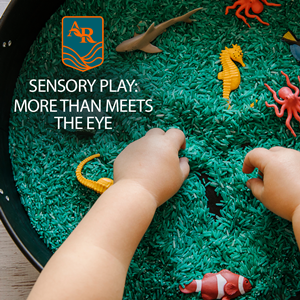
Sensory play is an important part of classrooms, especially for younger children, although people of all ages can reap the benefits. Sensory play may seem simple but there’s actually a lot going on underneath the surface as children explore and manipulate different objects. When it comes to sensory play, the five senses are commonly referenced: taste, smell, sight, hearing, and touch. However, there are additional functions that can benefit from sensory play. Proprioception (body awareness) and balance are also important areas of growth that are tapped into when sensory play is in motion. Here’s how it works.
Children Learn The Scientific Method of Observation
Whether they know it or not, even the youngest learners can begin learning the basics of the scientific method of observing, forming a hypothesis, experimenting, and forming a conclusion. Manipulating objects, mixtures, instruments, and movements can lead children to learn the cause and effect of actions or inaction and challenge their own thoughts about the results.
It Strengthens Sensory Synapses
Neuroplasticity is the brain’s ability to prune its synapses, or nerve pathways, based on life experiences. The majority of synapses are created during critical periods, many of which happen to be in the early childhood years. Children who engage multiple senses at once create more synapses and therefore enable their brain’s power to grow at exponential rates. Research has shown that this leads to the ability to complete more complex tasks.
It Improves Creativity, Language Development, Cognitive Growth, Motor Skills, and Social Interaction
All of those synapses that are multiplying at hyperspeed during sensory play contribute to improvements in creativity, language development, motor skills, social interaction, cognitive growth, and so much more! Through sensory play, each child’s brain has essentially created more channels for them to process information and gain a deeper understanding while they do it. It’s much like conditioning a muscle and being able to lift greater weight with more ease.
Sensory Play Helps Develop and Enhance Memory
Those synapses come into play again, particularly in the hippocampus which is the area of the brain that’s largely responsible for recalling information. Sensory experiences make their way through the hippocampus and eventually get stored in an area of the brain that retains long-term information. Activating these features in childhood creates the foundations for memory development and enhanced recollection abilities.
It Has A Calming Effect
Sensory play can be very cathartic as children become absorbed in the activity. Their focus often allows them to tune out the outside world and focus on their own thoughts and curiosity. It also allows them to learn to create boundaries between multiple senses so that they don’t become overwhelmed – for example, tuning out excess noise in a busy room. This can be particularly helpful for children who experience anxiety or difficulty in social interactions. Sensory play allows for a fun and safe space for children to explore freely.
As a parent, you may be surprised to know that sensory play can be beneficial for you, too! Getting your hands messy alongside your child will not only help both of you boost your brain power, but it’s a great way to create lasting memories together. Thank you, hippocampus!
